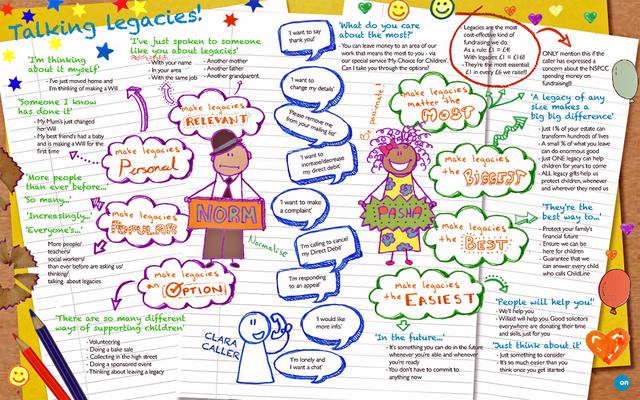NSPCC’s supporter care gifts in wills ‘mind map’
- Exhibited by
- Alex McDowell
- Added
- October 29, 2014
- Medium of Communication
- Target Audience
- Individuals
- Type of Charity
- Children, youth and family
- Country of Origin
- UK
- Date of first appearance
SOFII’s view
Another great example of the NSPCC always listening and innovating. SOFII looks forward to hearing that the ‘mind map’ did raise the projected £1,000,000.
Summary / objectives
To help colleagues in the supporter care team feel more comfortable and confident when promoting gifts in wills and to make more supporters aware of this option.
Background
The NSPCC's legacy team commissioned On Agency to devise a creative solution to help colleagues in supporter care speak with more supporters about gifts in wills. The NSPCC asked On to make use of insights gleaned from behavioural economic studies, specifically the recent RaC, Cabinet Office, CAF and Bristol University study released in May 2013 (details available on request).
Creator / originator
NSPCC/On Agency
Special characteristics
After listening to the supporter care team’s concerns and barriers when promoting gifts in wills, the solution was the development of a co-created ‘mind map’. This visual solution was designed to help the team see the challenge from the perspective of the supporter and to remind them of some helpful phrases or offers when promoting gifts in wills. The mind map was influenced by the aforementioned behavioural economic study that highlighted the importance of ‘social-norming’ statements and a ‘passionate’ ask. To this end, the mind map featured two characters: ‘Norm’ and ‘Pasha’ who spoke about how the conversation could reflect both the supporter’s and the charity’s passion for helping children when promoting gifts in wills.
Influence/impact
When the team started using the mind map, there was a significant increase int he number of supporters that they felt able to talk to about gifts in wills. This has increased the number of enquirers at no extra cost to NSPCC.
Costs
Agency research fees and small production costs in the design of mind map; exact cost to be confirmed.
Results
The supporter care team are currently generating between 50-100 legacy leads, or enquirers per month. This is the equivalent of 600-1200 prospects per year, or a telemarketing or direct mail campaign. Not only has this work saved the NSPCC money, but it has ensured more supporters have been offered a relevant alternative way of donating to a cause they care about. Above all, should just 10 per cent of these new enquirers go on to leave a gift, based on current average gift values and the gift types, this work could generate more than £1,000,000 per annum.
Why do you think this exhibit merits a place on SOFII?:
It's a great example of how creativity, innovation and insight can combine to empower fundraisers and grow income.
Adam Buckles the Global Legacy Specialist for Amnesty International’s International Secretariat presented the mind map at IWITOT 2016.
 View original image
View original image

















